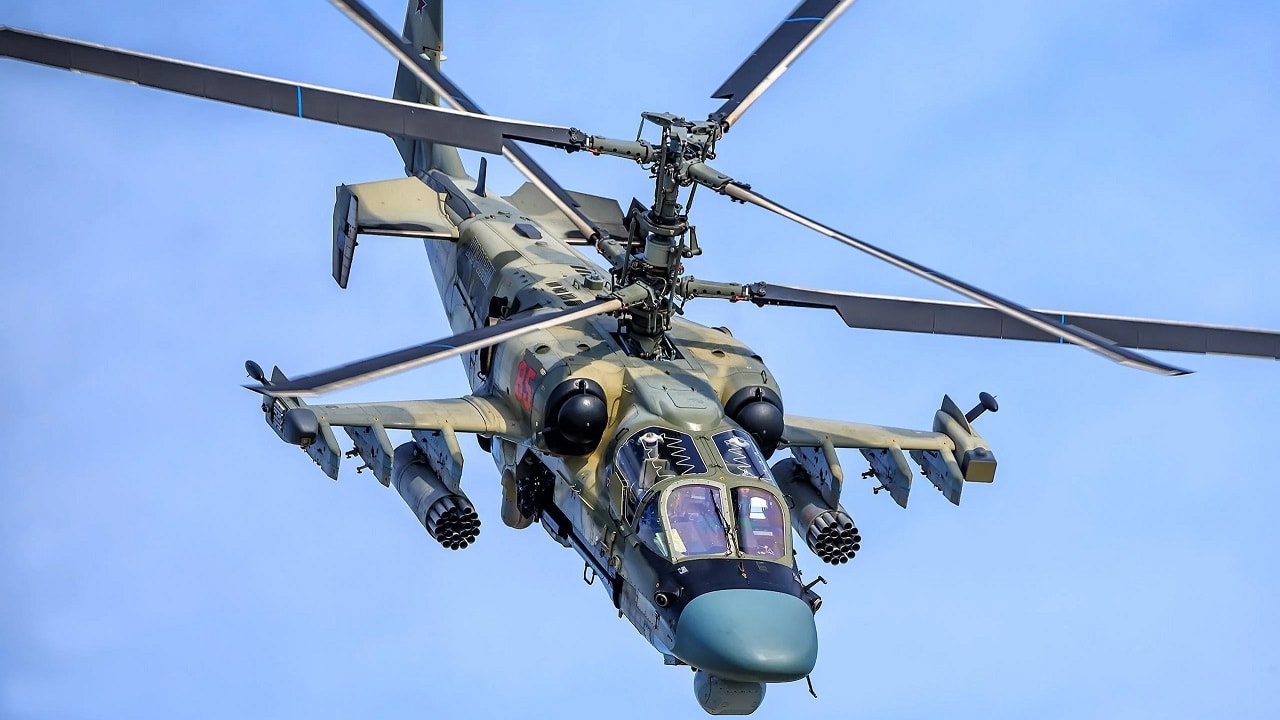The brutal battle for control of Ukraine’s eastern city of Bakhmut has made headlines in recent months due to its continued intensity and strategic importance. Russia has poured thousands of foot soldiers into the combat zone and more than 20,000 to 30,000 have died. This seven-month-long battle is considered to be both the longest and the bloodiest infantry battle since World War II. While personnel losses on both sides have been staggering, military equipment and airframes have not been spared. This week, a Russian Ka-52 combat helicopter was shot down.
According to Ukrainian officials, the chopper was destroyed during an airstrike attempt on Ukraine’s positions. Some analysts believe Moscow has lost around one-third of its Ka-52 fleet throughout the invasion.
A Brief History of the “Alligator” Helicopter
At the height of the Cold War, the Soviet Council Ministers directed its engineers to construct an attack helicopter. The product was the V-80Sh-1 prototype, which would ultimately become the Ka-50 helicopter. Over the next few years, various production examples of the chopper were revealed in Russia.
The collapse of the USSR, however, led to a severe drop in Russia’s procurement of all defense equipment. Instead of the hundreds of helicopters expected to join Russia’s air fleet, only one dozen Ka-50s were delivered.
During the conceptualization period of the Ka-52, the design team also worked on designing a helicopter dedicated to conducting battlefield reconnaissance and providing target designation.
When the budget was slashed in the early 90s, the team decided just to create an enhanced variant of the Ka-50 instead – resulting in the Ka-52.
Nicknamed “Alligator,” the Ka-52 is a highly maneuverable chopper that is capable of destroying enemy armored and unarmored targets. As an improved variant of its Ka-50 predecessor, the Alligator possesses many of the same basic design features.
The two choppers differ in a few structural areas, however. The Ka-52 has a wider nose and an extended fuselage due to its twin-seat design. Equipped with an advanced electronic countermeasures suite, the helicopter is quite sophisticated compared to its earlier variant.
The chopper sports jamming pods, laser detection, and radar warning. Russian state military exporter Rosoboronexport told Newsweek that the Alligator can “execute any combat task with high efficiency.” With coaxial main rotors, the chopper can travel at a maximum speed of roughly 186 miles per hour.
The Alligator Has Not Performed Well in Ukraine
While the Kremlin has used its fleet of Ka-52 helicopters to propagate its offensive war in the past, some industry experts and analysts don’t believe the chopper has performed as well as expected.
Last year, the UK-based think tank the Royal United Services Institute released a report claiming that Alligator-strikes’ accuracy while flying at low altitudes was generally low. Additionally, the Ka-52s shot down in the current war appear to have been lacking proper maintenance protocols.
The report notes that the helicopters’ “modern encrypted radio sets have been found without the encryption keys needed to use them, and in others, the radar and other sensors have been found either in the stowed position with pinks or covers still fitted that prevent them from working.”
Moscow’s fleet of Ka-52 helicopters has continued to take heat in Bakhmut. Russia’s proclaimed top-of-the-line chopper has proven to be quite the liability for the Kremlin’s war efforts in Ukraine.
Maya Carlin, a Senior Editor for 19FortyFive, is an analyst with the Center for Security Policy and a former Anna Sobol Levy Fellow at IDC Herzliya in Israel. She has by-lines in many publications, including The National Interest, Jerusalem Post, and Times of Israel. You can follow her on Twitter: @MayaCarlin.

